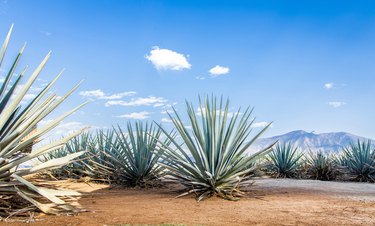
Mexico is the only country in the world that produces agave nectar, and it has only been used as a commercial sweetener since the 1990s. What does agave (Agave america, USDA plant hardiness zones 5 through 10) taste like on its own, though? Is it similar to honey, more like sugar or something else entirely?
Uses for Agave Flavor
Video of the Day
The flavor of agave is described as tasting similar to honey and a good deal sweeter than sugar. Darker varieties can taste more like maple syrup, while the lighter agave nectars are more subtle. The nectar is made from agave plant juice, which is also where tequila comes from. Many bars and restaurants use agave syrup for cocktails, and these modern drinks are much more complex and interesting than traditional margaritas.
Video of the Day
Agave also tastes amazing in other drinks, including hot ones. The best agave for coffee will balance out the coffee's bitterness without making it too sweet.
How Is Agave Nectar Made?
Agave nectar is harvested from live, mature plants. The tops are sliced off, hollowed out and placed back on the plants. The nectar then gathers in the tops, which are later removed and emptied.
Agave nectar is sold in raw or regular form. Both are boiled down to concentrate the agave flavor, but there's a difference: Raw agave is not heated to more than 120 degrees Fahrenheit and still has living enzymes. It is less filtered and more full-bodied, but it does not really have any added health benefits. People on raw food diets may prefer it, though.
You can find agave syrup in different varieties, from light to dark. It is thought that darker agave syrup has more minerals and nutrients. Agave is good for you because it is high in iron, calcium, magnesium and zinc. It is also a good source of vitamins C, D and E. Agave also has a low glycemic index, but some feel that it is just a refined fructose. For those who like agave, there is no reason to avoid it. The best advice is to avoid consuming it in large doses, which also makes sense with honey or sugar.
Other Ways to Enjoy Agave
Aside from being a sweetener for hot and cold drinks, agave can be used interchangeably with honey in certain foods. It can be poured lightly onto ice cream, yogurt and cereal or added to salad dressings. The nectar adds a unique flavor that can provide a nice break from honey or sugar.
Agave nectar is also good for baking but only use 3/4 the amount that you would use for sugar. If substituting it for honey, you can use the same amount. It is not always a good choice when baking hard candies or cookies, though, since it often makes baked goods brown faster. To avoid burning, reduce the oven's temperature by about 25 degrees or so.
Don't be shy about using agave in other recipes. For instance, you can prepare an agave-barbecue roasted chicken, which calls for 5 tablespoons of agave syrup, tomato paste, Dijon mustard, cider vinegar, olive oil and spices. Another recipe using agave is that for poppy seed pancakes, which combines 1/3 cup of agave nectar with oranges, a lemon, whole-wheat flour and organic buttermilk.